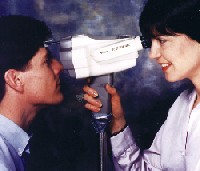Rhode Island has passed a new law that requires all children in the state to receive a vision screening or a comprehensive eye exam before starting elementary school. Also, all children who fail the screening must receive a follow-up exam from an optometrist or ophthalmologist. Additionally, eye exams are required for all children who have neurodevelopmental delays. The law goes into effect January 1, 2006.
In related news, the second phase of the Vision In Preschoolers Study (VIP Study) has found that two of the best-performing tools for vision screening of preschool children (Retinomax Autorefractor and SureSight Vision Screener) are as effective when used by nurse screeners and lay screeners as they are when used by optometrists and ophthalmologists.
A third tool (Linear Lea Symbols VA screening), which was has been one of the most effective screening tools when used by optometrists and ophthalmologists, was much less effective when used by nurse screeners and lay screeners. However, when the test distance was shortened and the test format was modified, lay screeners had a marked improvement in performing the test.
Parents should be aware that vision screening programs do not substitute for a comprehensive eye examination by a licensed eye care professional, says Paulette P. Schmidt, O.D., chairperson of the VIP Study and a professor of optometry and vision science at Ohio State University College of Optometry. However, vision screening may be a valuable way to detect children who would benefit most from an eye examination.
But this study actually underscores the shortcomings of vision screenings, say some optometrists. This study makes it clear why children need a comprehensive vision examination before starting school, says Joel Zaba, O.D., a child development specialist and spokesman for the Vision Council of America. The study shows that just 37% to 68% of vision problems are detected by vision screenings. Our children simply deserve better odds when dealing with one of the most important tools they have for learning.
 |
In related news, the second phase of the Vision In Preschoolers Study (VIP Study) has found that two of the best-performing tools for vision screening of preschool children (Retinomax Autorefractor and SureSight Vision Screener) are as effective when used by nurse screeners and lay screeners as they are when used by optometrists and ophthalmologists.
A third tool (Linear Lea Symbols VA screening), which was has been one of the most effective screening tools when used by optometrists and ophthalmologists, was much less effective when used by nurse screeners and lay screeners. However, when the test distance was shortened and the test format was modified, lay screeners had a marked improvement in performing the test.
Parents should be aware that vision screening programs do not substitute for a comprehensive eye examination by a licensed eye care professional, says Paulette P. Schmidt, O.D., chairperson of the VIP Study and a professor of optometry and vision science at Ohio State University College of Optometry. However, vision screening may be a valuable way to detect children who would benefit most from an eye examination.
But this study actually underscores the shortcomings of vision screenings, say some optometrists. This study makes it clear why children need a comprehensive vision examination before starting school, says Joel Zaba, O.D., a child development specialist and spokesman for the Vision Council of America. The study shows that just 37% to 68% of vision problems are detected by vision screenings. Our children simply deserve better odds when dealing with one of the most important tools they have for learning.
Vision in Preschoolers Study Group. Preschool vision screening tests administered by nurse screeners compared with lay screeners in the Vision In Preschoolers Study. Invest Ophthalmol Vis Sci 2005 Aug;46(8):2639-48.
Vol. No: 142:8Issue:
8/15/2005

